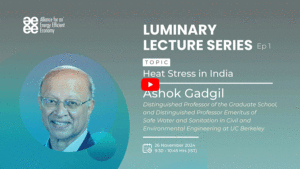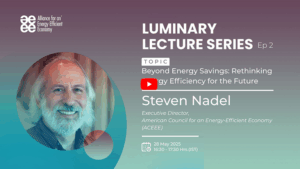The Luminary Lecture Series is the Alliance for an Energy Efficient Economy’s knowledge‑exchange platform – a spotlight stage for pioneers who are rewriting the energy‑efficiency rule‑book. Each episode convenes a global thought‑leader – economists, technologists, city‑makers, and more – to spark fresh ideas, showcase best practices, and inspire collaboration across governments, businesses, academia, and civil society.
Expect sharp perspectives, real‑world wins, and candid discussions of hurdles, distilled into resources you can act on today.
By uniting visionary thinking with practical know‑how, the Luminary Lecture Series equips stakeholders to scale solutions and propel toward a climate‑resilient, energy‑secure future.
Episode 1: ‘Heat Stress in India’ by Prof Ashok Gadgil
 Extreme temperature increases outside of natural climate variation have become our new normal. 2023 was the hottest year in over a century of available weather data, confirmed by NASA. Given its geography, population and socio-economic characteristics, India is highly vulnerable to extreme heat. In the lecture Prof Ashok Gadgil explores strategies to mitigate heat stress and ensure equitable access to outdoor and indoor thermal comfort for India’s most vulnerable populations.
Extreme temperature increases outside of natural climate variation have become our new normal. 2023 was the hottest year in over a century of available weather data, confirmed by NASA. Given its geography, population and socio-economic characteristics, India is highly vulnerable to extreme heat. In the lecture Prof Ashok Gadgil explores strategies to mitigate heat stress and ensure equitable access to outdoor and indoor thermal comfort for India’s most vulnerable populations.
